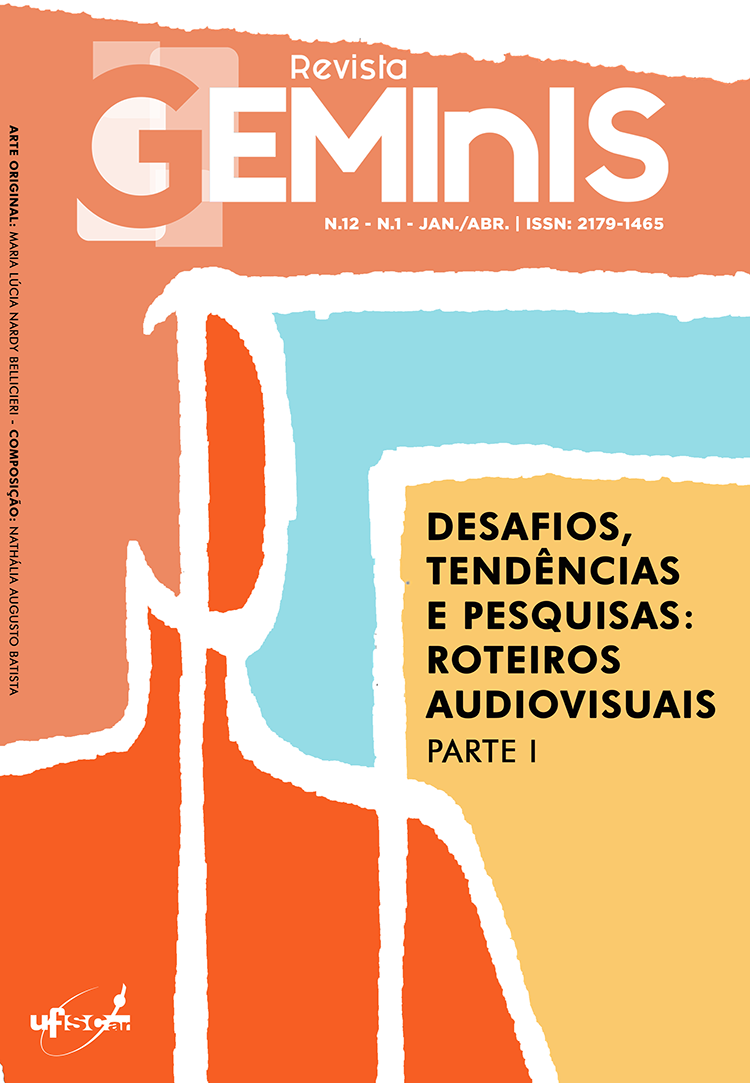NETFLIX BRAND'S DISCURSIVE ETHOS ON YOUTUBE
INTERDISCURSIVITY AND STORYTELLING ON CONTENT SPREADABLE MEDIA STRATEGIES
DOI:
https://doi.org/10.53450/2179-1465.RG.2021v12i1p189-211Keywords:
Netflix, discursive ethos, storytelling, brand discourseAbstract
The paper analyzes Netflix Brasil's promotional videos on YouTube in order to study the construction of discursive ethos of the brand through its enunciation, the use of storytelling and discursive strategies for propagation of content. The analysis highlights the interdiscursivity as a key element for the success of videos that use discursive strategies that interrelate characters from their programs with national media personalities. The humor genre adopted in the videos contributes to the construction of the discursive ethos of the brand, besides acting as an important element for both the fan engagement and the creation of spreadable media from brand discourse.
Downloads
References
APPADURAI, A. A vida social das coisas: as mercadorias sob a perspectiva cultural. Niterói: Editora da Universidade Federal Fluminense, 2008.
BIANCHINI, M.; CAMIRIM, B. Mais histórias, mais vozes: Netflix e a promessa da diversidade na tela. Revista ALAIC, v. 17, n. 31, p. 156-166, maio-agosto 2019.
CASTRO, M. L. D. de. Autopromocionalidade em televisão: movimentos e configurações. Revista Animus, Santa Maria, v. XV, jan-jun 2009
CASTRO, M. L. D. de; BON, G. Formato promocional e suas configurações. Anais do XXIX Congresso Brasileiro de Ciências da Comunicação. Intercom – Sociedade Brasileira de Estudos Interdisciplinares da Comunicação – UnB – 6 a 9 de setembro de 2006. Anais... Intercom – Sociedade Brasileira de Estudos Interdisciplinares da Comunicação. 2006.
DOMINGOS, A. A. Storytelling: fenômeno da era da liquidez. SIGNUM: Estud. Ling., Londrina, n. 11/1, ps. 93-109, jul. 2008. Disponível em: http://www.uel.br/revistas/uel/index.php/signum/article/view/3085. Acesso em 20 out. 2020.
ECO, Umberto. Seis Passeios pelos bosques da ficção. São Paulo: Cia. das Letras, 1997.
ÉPOCA. Netflix é a marca mais amada pelos brasileiros. Época Negócios Online 21 nov. 2016. Disponível em: https://epocanegocios.globo.com/Marketing/noticia/2016/11/netflix-e-marca-mais-amada-pelos-brasileiros.html. Acesso em: 12 ago. 2019.
FRANDOLOSO, P. E.; FEIJÓ, V. C. Storytelling e Gestão de Marca. Temática, João Pessoa, ano X, n. 08, ps. 164-181, ago. 2014. Disponível em: http://www.periodicos.ufpb.br/ojs/index.php/tematica/article/view/20300
GENETTE, G. Introduction à l’architexte. Paris: Seuil, 1979.
JENKINS, H. Cultura da Convergência. São Paulo: Aleph, 2008.
JENKINS, H.; GREEN, J.; FORD, S. Cultura da conexão: criando valor e significado por meio da mídia propagável. São Paulo: Aleph, 2014.
JOST, F. Compreender a televisão. Porto Alegre: Editora Sulina, 2007.
JOST, François. Quand y a-t-il énonciatio télévisuelle? BOURDON, J.; JOST, F. (orgs.). Penser la télévision: actes du colloque de Cerisy. Paris: Éditions Nathan/INA, 1998.
KOTLER, P. KARTAJAVA, H., SETIAWAN, I. Marketing 4.0: do tradicional ao digital. [recurso eletrônico]. tradução de Ivo Korytowski. Rio de Janeiro: Sextante, 2017.
MAINGUENEAU, D. A propósito do ethos. In: MOTTA, A. R.; SALGADO, L. (Org.). Ethos discursivo. São Paulo: Contexto, 2008.
MASSAROLO, J. C. Storytelling Transmídia: narrativa para multiplataformas. Tríade, Sorocaba, SP, v.1,n.2, ps. 335-347, dez. 2013. Disponível em: http://periodicos.uniso.br/ojs/index.php/triade/article/view/1764/1646
MASSAROLO, J.C.; MESQUITA, D. Estratégias Contemporâneas do storytelling para múltiplas telas. Revista Latinoamericana de Ciencias de la Comunicación. v.11. n.21. Jul.-Dez. 2014.
MITTEL, J. Complex TV. The poetics of contemporary television storytelling. Nova Iorque; Londres: New York University Press, 2015.
ORLANDI, E. P. Análise de discurso: princípios e procedimentos. Campinas/SP: Pontes, 1999.
PALACIOS, F; TERENZZO, M. O guia completo do storytelling. Rio de Janeiro: Alta Books, 2016.
PEREZ, C. Signos da Marca. São Paulo: Cengage, 2004.
PEREZ, C. Gestão e Semiótica da Marca: a Publicidade como Construção e Sustentação Sígnica. In: XXX Congresso Brasileiro de Ciências da Comunicação. 2007, Santos. Anais...Santos, 2007.
SALMON, C. Storytelling: la machine à fabvriquer des histoires et à formater les esprits. Paris: Éditions La Découverte, 2010.
SALGADO, T.B.P.; MIRANDA, E.C.D. Estranhar os algoritmos: Stranger Things e os públicos de Netflix. Revista GEMInIS, v. 8, n. 1, p. 38-59, 19 jul. 2017.
STRASSBURGER, D. Formatos promocionais: estratégias de publicização adotadas pela RBS TV1. Intercom – Sociedade Brasileira de Estudos Interdisciplinares da Comunicação XXXV Congresso Brasileiro de Ciências da Comunicação – Fortaleza, CE – 3 a 7/9/2012
XAVIER, A, Storytelling [recurso eletrônico] 1. ed. - Rio de Janeiro: BestSeller, 2015.
WILLIAMS, R. Televisão: tecnologia e forma cultural. São Paulo: Boitempo; Belo Horizonte, MG: PUC-Minas, 2016.
Downloads
Published
How to Cite
Issue
Section
License
Authors who publish in this journal agree to the following terms:
a. Authors retain copyright and grant the journal the right of first publication, with the work simultaneously licensed under a Creative Commons Attribution License that allows sharing of the work with acknowledgment of authorship and initial publication in this journal.
b. Authors are authorized to assume additional contracts separately, for non-exclusive distribution of the version of the work published in this journal (eg, to publish in an institutional repository or as a book chapter), with acknowledgment of authorship and initial publication in this journal.


